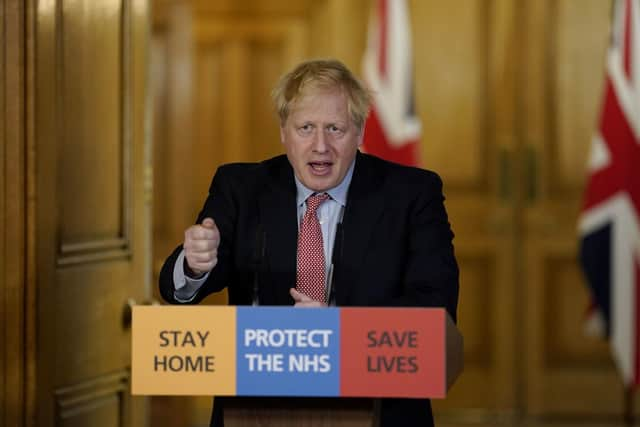Coronavirus: Prime Minister Boris Johnson tests positive for coronavirus
and live on Freeview channel 276
Boris Johnson announced on social media that he had been diagnosed with the virus after developing mild symptoms in the last day.
In a post on Twitter he said: ‘Over the last 24 hours I have developed mild symptoms and tested positive for coronavirus.
Advertisement
Hide AdAdvertisement
Hide Ad‘I am now self-isolating, but I will continue to lead the government’s response via video-conference as we fight this virus.
‘Together we will beat this.’
Coronavirus: the facts
What is coronavirus?


Covid-19 is a respiratory illness that can affect lungs and airways. It is caused by a virus called coronavirus.
What caused coronavirus?
The outbreak started in Wuhan in China in December 2019 and it is thought that the virus, like others of its kind, has come from animals.
How is it spread?
Advertisement
Hide AdAdvertisement
Hide AdAs this is such a new illness, experts still aren’t sure how it is spread. But similar viruses are spread in cough droplets. Therefore covering your nose and mouth when sneezing and coughing, and disposing of used tissues straight away is advised. Viruses like coronavirus cannot live outside the body for very long.
What are the symptoms?
The NHS states that the symptoms are: a dry cough, high temperature and shortness of breath - but these symptoms do not necessarily mean you have the illness. Look out for flu-like symptoms, such as aches and pains, nasal congestion, runny nose and a sore throat. It’s important to remember that some people may become infected but won’t develop any symptoms or feel unwell.
What precautions can be taken?
Washing your hands with soap and water thoroughly. The NHS also advises to cover your mouth and nose with a tissue or your sleeve (not your hands) when you cough or sneeze; put used tissues in the bin immediately and try to avoid close contact with people who are unwell. Also avoiding touching eyes, nose and mouth unless your hands are clean.
Sources: World Health Organisation and NHS
Comment Guidelines
National World encourages reader discussion on our stories. User feedback, insights and back-and-forth exchanges add a rich layer of context to reporting. Please review our Community Guidelines before commenting.
